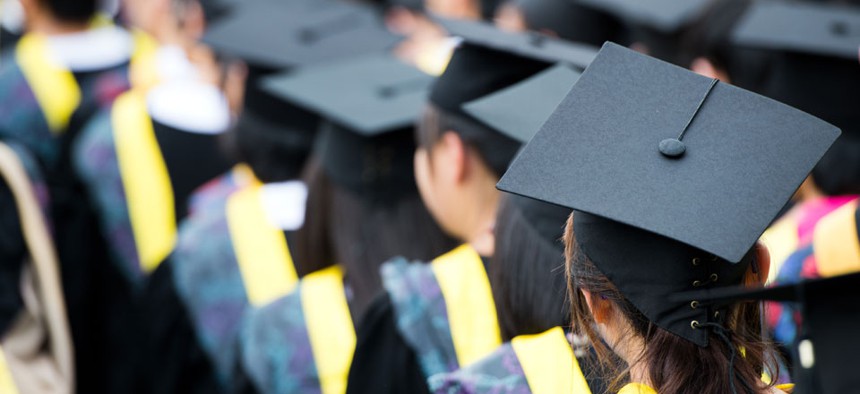
hxdbzxy/Shutterstock.com
The Rise of Professional Women
Women now outpace men in every type of postsecondary degree conferred
Women have outpaced men in the number of postsecondary degrees conferred for decades. In 2010, women started to surpass men in attainment of degrees higher than a bachelor's degree. That same year, women became the majority of American workers.
The increase in the number of women going to college has helped narrow the gender pay gap, according to research from the Pew Research Center. And it has rearranged gender norms as well. According to a Pew analysis of census data, 21 percent of married women in 2012 had husbands who were less educated than they were.
Women of all races and ethnicities are more likely to pursue education beyond a bachelor's degree than ever. National Journal analyzed federal census data to get a better sense of the trend.

The total number of U.S. adults holding master's, professional, or doctoral degrees has risen over the past few decades. In general, more-advanced education is linked to higher incomes.
Since 1970, the share of people with graduate degrees in the top three income deciles has increased from 41 percent to 61 percent, according to a 2010 report from the Georgetown Center on Education and the Workforce. The center estimated that master's degree holders stand to earn $3.837 million over the course of their lifetimes, compared with $3.380 million for bachelor's degree holders. The center projected that professional degree holders--doctors, lawyers, and the like--would earn $4.650 million, about four times the lifetime earnings projected for high school dropouts.

The achievement gap between women and men continues to widen as women outpace men in their pursuit of higher education. Through 2021, the Education Department projects faster growth in associate's, bachelor's, master's, and doctoral degrees conferred on women than in degrees conferred on men.

African-American women have outpaced African-American men in advanced-degree attainment for decades, and the divide is widening. Meanwhile, Asian-Pacific Islander men have been more likely to earn advanced degrees than Asian-Pacific Islander women since the census began tracking the divide in 1999.

Trend lines charting the number of degrees attained by the adult population don't wholly capture the rapid growth in advanced-degree attainment among women of all races and ethnicities over the past decade. The surge in degree attainment among Hispanic women has been particularly striking.

White students and Asian-American students are often lumped together education-attainment discussions. But Asian-Pacific Islanders are the most highly educated community in the U.S.: 55 percent of adults with Asian heritage hold a four-year degree or a more advanced credential, compared to 35.2 percent of white adults.
As demographics change, advanced-degree attainment in minority communities is set to take off. In 2012, for the first time, a greater share of Hispanic recent high school graduates enrolled in college than did whites, the Pew Research Center reports.
(Image via hxdbzxy/Shutterstock.com)






